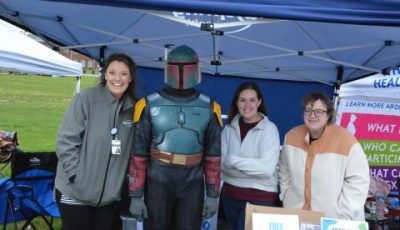Whitley County Board of Health discusses COVID-19, other issues during quarterly board meeting Monday evening
As one might expect, much of the Whitley County Health Department’s focus in recent months has remained COVID-19, which continues to remain high in Whitley County.
Whitley County’s seven day rolling average for its incidence rate as of Sunday was 45.7 cases per 100,000 people, which places it in the “red” category based on the state’s COVID incidence scale, and Whitley County has been in the “red” since late September, Whitley County Public Health Director Marcy Rein told the Whitley County Board of Health during its regular quarterly meeting Monday.
“Right now, our numbers don’t look like they are trending steeply in the right direction,” she added.
Kentucky has set a key indicator monitoring system with five key COVID-19 indicators that color code from green to red, including: hospital data, cases, deaths, public health capacity and healthcare capacity.
“We are red currently because hospital data is trending high, case burden is high, and the death rate is moderately high,” Rein noted about the situation statewide. “Public health capacity, specifically contact tracer capacity, is very low. The only indicator remaining green at this point is health care capacity, which looks at our percentage of ICU beds in use, which right now is 72.46 percent, and 32.64 percent of our ventilators are in use. That is kind of a big picture look at the status of the state,” Rein said.
Rein said a major concern for her is staff burnout due to COVID-19 investigations, and the health department is working to come up with solutions that are manageable.
“We know that the staff, who are provided by the state through CARES Act money, will not be available to us after the new year. We have to come up with solutions that will be sustainable to us,” Rein added.
So far, the health department has spent $95,808.22 on COVID-19 activities between the first of July and the end of October, and has gotten reimbursed $50,285.80.
Rein said that she is writing a small grant application in an effort to get more funding to help cover potential vaccination costs.
“We are hopeful we will see additional financial support for that,” she added.
Harm reduction clinic
Rein also updated the board of health on the status of various other programs Monday.
Between Sept. 1 and Nov. 6, the health department’s harm reduction clinic, which is also known as the needle exchange program, saw 175 unique individuals, which includes 49 new individuals.
During this time frame, 420 people came through the Williamsburg clinic, which took in 11,691 dirty needles and distributed 11,757 clean needles, and 34 people came through the Corbin clinic, which took in 865 dirty needles and distributed 1,142 clean needles.
Rein noted that there will always be more needles distributed than brought in because participants aren’t required to bring in needles during their first visit.
Rein said that one of the things the health department watched after it opened the Corbin harm reduction clinic was whether people would try to go to both the Corbin and Williamsburg clinics during the same week, which so far has not happened.
Other business
In other business, the board:
• Approved the fiscal year 2019-2020 audit. Andy DeMoss, a CPA with RFH PLLC, presented the health department’s audit to the board of health, which contained no major findings.
The audit showed an increased fund balance of $316,000 more than budgeted, but he noted that the required contribution to the state retirement system remained at 49 percent, and is expected to jump up to about 80 percent next fiscal year, because the state pension fund is severely underfunded.
The pension system liability for Whitley County is estimated at a little over $20 million for direct pension payments and a little over $3 million to cover future health insurance costs for retirees.
“Overall, for a first year with you all I was very pleased with how things went,” DeMoss noted about the audit.
• Discussed finances. Rein noted that service fees are running about $157,000 under projections largely due to COVID-19 limiting some services. “It’s not terribly under so I am not worried about it at this point,” Rein told the board.
• Approved Christmas bonuses of up to $500 for full-time employees, and lesser bonuses for part-time workers. Rein noted that health department employees haven’t receive an annual pay raise in two years. There are 38 full-time staff members, who will be covered by the bonuses, which are estimated to cost the district about $19,211. Rein thanked the board for the Christmas bonuses. “This is important to staff particularly this year,” she added.
- Set 2021 quarterly meeting dates for March 15, June 21, Sept. 20, and Nov. 15. The meetings are slated to take place at 7 p.m., but the location of the meetings is undetermined because of COVID-19.







